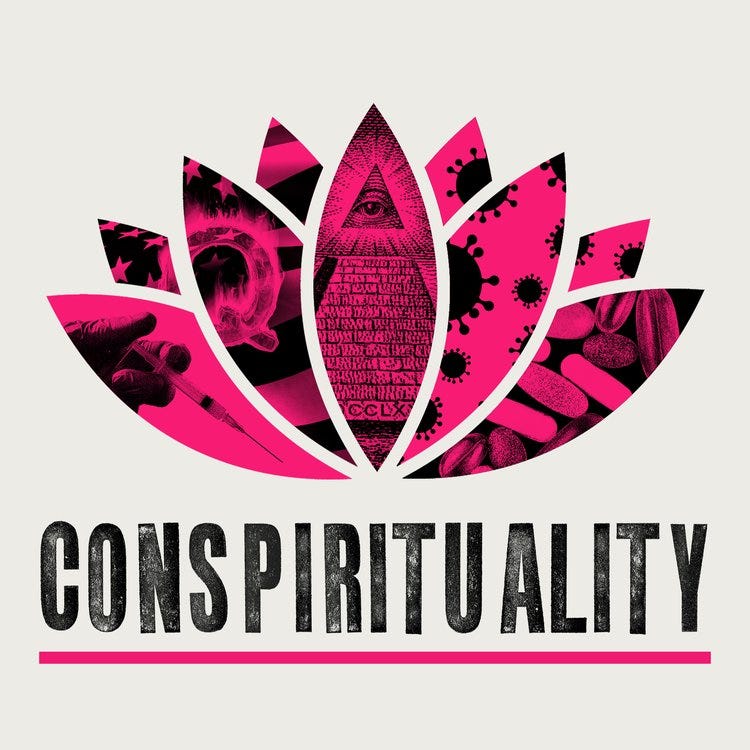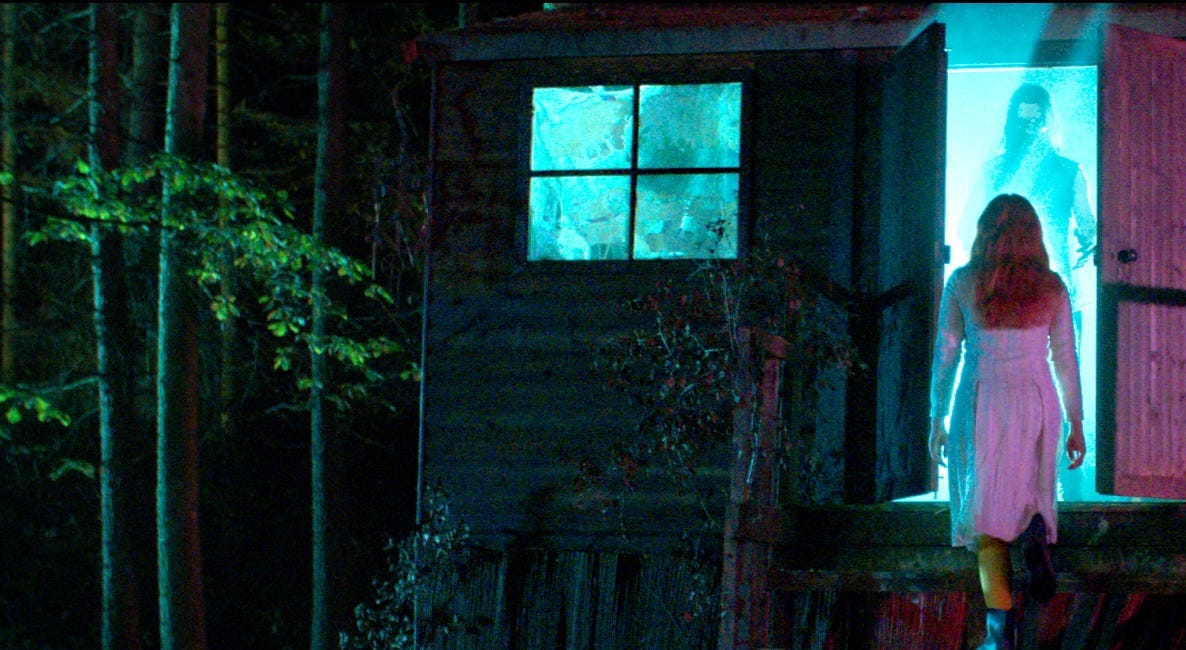"We didn’t survive cults so that Netflix vultures could monetize our shame"
The Conspirituality Episode is finally here: we sit down with author and host Matthew Remski.
These days Matthew Remski is best known as the co-host of Conspirituality, the podcast about “dismantling New Age cults, wellness grifters, and conspiracy-mad yogis” he created with fellow researchers Derek Beres and Julian Walker, so of course I found his work sometime in 2021 by searching “what happened to Russell Brand”, but we’re going back and forth in the weeks leading up to the release of the Conspirituality book (Public Affairs), and this conversation should motivate you to pre-order the book on the grounds of its own considerable merit alone.
Topics include: getting recruited in “brick and mortar cults” vs. getting sucked into a digital-first online community, the ways Yoga and general wellness have been sold to Western consumers over the past decades, the political posturing adopted by spiritual influencers hungry for engagement, the infinite boredom stemming from “self-care and optimisation and working endlessly on your mindfulness”, the gilded age of cult documentaries and memoirs, how to avoid turning tragedies into trauma porn, the “survivor-to-crusader pipeline”, de-platforming, the Disinformation Dozen, and how to keep going in the middle of this.
Enjoy.
As you've recounted in podcast episodes - and you get back to this in the book - two of you were recruited in "brick and mortar cults": you attended a lecture, you walked into a yoga studio, you physically joined a high-demand group - in sharp contrast with whoever got sucked into comparable groups by consuming videos and audio, or stumbling upon digital-first communities. I think this difference makes you pretty great at navigating the "conspirituality" landscape: it feels like your physical experience of such scenarios still gives you a bit of an edge when it comes to dissecting this kind of dynamics. Is it something that tracks with you as well? Have you come to see yourself as 'the ones who got out soon enough', compared to people who keep bouncing from group to group ?
I don’t know that either Julian or I “got out soon enough.” I think it’s more like we were in our groups for long enough (six years) and it was long enough ago (almost 20 years) that we’ve felt our own reassimilation process unfold with some completeness, but we’ve also been able to track friends, colleagues, and the culture more broadly as people enter and leave various groups. We’ve also been in the critical space vis-a-vis cults for about a decade, so we’ve seen how people recover, quickly or slowly, and how those experiences go on to shape lives.
We’ve been fortunate in a way: I think that as GenX cult survivors, we exited that world at a lucky time—young enough in the timeline to rebuild politically engaged lives. Millennials who exited cults a decade or more after we did entered an even more chaotic polity and immiserated economy. Now, with the digitization of almost the entire process, zoomers will struggle long and hard to find the threshold between cultic and non-cultic online spaces.
Because you’re right: the webification of cultic dynamics changes a lot of things. It dissipates the social assaults and distortions over a wider field, and erodes the distinction between IG influencer and high-demand leader. There are some people, like Teal Swan and Tony Robbins, who still straddle both worlds. But they are rare. Online cultism has far lower overheads and commitment thresholds. Maintaining a Squarespace site is a lot easier than buying and caring for an ashram. It’s more sustainable for more leaders, because they can sequester their private lives away from the screen: they’re not always under scrutiny or having to manage the devastations of their followers.
What this also means is that online cultic commitments are lower on the member side as well. It’s a buyer’s market, with countless brands and influencers vying for attention and conversions. Leaders cannot be as concerned with retention in such a competitive market. They have to focus on acquisitions. And this may change and accelerate the nature of the content. This is part of the story of QAnon, which rose to the forefront of digital cultism in part because of its political utility, but also because it relentlessly escalated its morbid messaging. But it has a high attrition rate, and never really gathers any assets.
Bottom line is that there may be fewer Yogi Bhajans and Keith Ranieres in this landscape, because you can make bank without all of the capital liabilities, and the paranoia that comes with protecting them. The focus can be purely on the content.
You've been focused on what I would call 'the shadow side' of many spiritual practices as they've been sold to Western consumers: "disengage from worldly concerns" led to wide swathes of YogaWorld / Meditation World refusing to keep up with current affairs, framing politics as an inherently dirty, unworthy interest, and this made them far more vulnerable to solipsism on one hand, junk information on the other. Do you see this changing anytime soon?
It’s true that 50 years of yoga and wellness discourse has been anti-political. All the major influencers put themselves above the dialectics of history and power, and told their mainly white and middle class followers that engaging with worldly concerns was beneath their holy dignity. Over time, this axiom combined with something a little more demoralized and reasonable emerging in the late 70s: the wide-spread belief that social change was not really in the cards, but maybe you could change the world where you were, by changing your body and mind.
The COVID-era explosion of conspirituality gave a new existential purpose to the self-project of neoliberal wellness. The truth is that self-care and optimisation and working endlessly on your mindfulness is incredibly boring. Once you make the few behavioral shifts that give measurable results, you’ll plateau in the nowhere-land of a slightly better self that sadly yearns for more. If you professionalize into the world, it can be worse, because you’re stuck on upgrading smoothies and reiki workshops to an increasingly avaricious market. For anyone with a conscience, this will be nauseating after a while.
So when conspirituality enlivened this space, otherwise depoliticized gig-workers found a new mission. The smoothies and supplements and breathing practices were not just for self-care anymore. You could now do yoga to fend off the virus, or the vaccine, or the social request to respect public health advisories. This was extremely exciting for influencers who secretly felt that their products had lost their shine. And if they were harboring shamefully hidden reactionary views, they were suddenly free to be authentic and righteous assholes.
Has it changed already, in any way you can measure?
The accelerated politicization of yoga, wellness, and the New Age has already changed the landscape, but mainly in performative ways that will be hard to assess in terms of their IRL impact. Political posturing is now key to many spiritual brands, not because the influencers hold strong ideological principles, but because politics provides an added spice to their content. In some cases, yoga influencers who got into QAnon in 2020 were walking it back in 2021 because they weren’t even clear on what it was, beyond its value for juicing engagement. With some of this crowd, we’re talking about a sheltered white middle class that may not fully appreciate the IRL consequences of encouraging conspiracy theories that marginalize racialized and trans people.
But in general, we’re not talking about a demographic with any real experience or even stomach for boots-on-ground political work. Perhaps the strongest impact of conspirituality clicktivism will be a general uptick in cynicism and demoralization felt by people interacting in a social media universe in which there seems to be no real contact or reality principle at play.
On occasion, you have shown a certain antipathy towards "cult documentaries" - to the extent that they became a trend in scripted reality media. It’s true that some have displayed very blurry ethics, while others have been mostly preoccupied with providing their audience a horror sizzle reel of sorts. Do you ever back away from a story for fear you will end up glamourising the main players, or introducing their output to your own audience?
The iron-clad rule of late capitalism is that every bit of resistance to it must be itself commodified, as quickly as possible. Kurt Cobain couldn’t spill juice on his sweater without the stain pattern turning up on a Paris runway. So yes, we have to be vigilant about refusing to convert tragedy into trauma-porn. We have to refuse to mystify charismatics. They do that for themselves.
This is even more important now, because we have entered a gilded age of cult documentaries and memoirs, and only a few of them manage to educate more than entertain. What sucks about that is that when filmmakers don’t get it right, when they sensationalize or stigmatize, when they use “true crime” rhythms and mechanics or indulge in black-and-white storylines, we don’t learn anything, but Netflix makes money. The interviewees can wind up feeling exploited, and if that happens enough, better journalists have a harder time forging trust with subjects.
One of the worst things that happens with the sensationalized cult documentary is that it otherizes the whole phenomenon. It makes viewers think that they would never get wrapped up in a high-demand group. But worse than that, it creates the impression that a company like NXIVM is categorically different from any other top-down corporation. If we can make cults super weird, we don’t have to interrogate the high-demand groups that are more familiar to us. But cultic organizations are not bugs in the system. They’re a feature.
On a personal note, I’ve had enough interactions with production companies and doc makers at this point to be able to say that the entire industry is wild-west chaotic. Scholars and journalists routinely get their work stolen from them under the guise of “possible future consultation,” and actual researchers are often treated like Hollywood contract writers, asked to make stories more exciting or sexy. It’s a mess. We didn’t survive cults so that Netflix vultures could monetize our shame!
Personal grievances aside, I want to state that recovering from a cult experience takes years. If someone ends up coming out and immediately positioning themselves as a cult expert, come to save the world from cults, there’s a good chance they are continuing some very short-sighted behaviours. The survivor-to-crusader pipeline is real, and it doesn’t help anybody.
That’s why everyone should read Slonim Wood 9, by Daniel Levin, which became the backbone of “Stolen Youth” on HBO. That was a 10/10 process and product, with Levin taking years to assemble his memoir, and then acting as a trauma-informed subject coordinator for his fellow survivors, and never losing the chain of custody over their story.
There’s a regrettable fact we’re dealing with: de-platforming rarely seems to work as intended. Alex Jones got wealthier when he was kicked out of social media, because he was free to position himself as “the most persecuted man on Earth” (at least until the 2022 trial), while the so-called 'Disinformation Dozen' - several of which are splendidly profiled in your book as chief spreaders of antivax propaganda - haven't taken a meaningful hit even after being shamed, having their reach reduced and so on. We’re living in a timeline where Robert F. Kennedy Jr. is challenging Joe Biden, no matter how weak he is as a Presidential hopeful and how many bad actors are propping him up at the moment. It’s easy to feel despair. What keeps you going? And what can a private person do in light of what looks like systemic failure ?
I have many periods of despair and what keeps me going is decent sleep, walking a lot, logging the fuck off, and everyday tasks and gratitudes, especially involving parenting. Even with that I must be careful to not project my anxieties forward into their world, which is already complicated beyond my imagination. It’s the noblest project, to strive to maintain a position of generosity and love and acceptance and support towards a dependent, no matter how depressed I am. And in some moments, I am able to say “Well if I can do it in this small circle, how far can I extend it outwards?” Can I feel that way about the people I study?
Not everyone can pinpoint a ground zero like this, so I’m speaking from privilege. But if you can find something real to love and support alongside other people, I think you can also learn to let systemic failures just be what they are. Predictable, boring, absurd, and horrific. There’s no way out, they will just keep coming, but this will never change what’s right to do, or how good it feels to reach out and help.
Giving time to somebody you don’t know in the weeks leading up to a book release is an act of rare generosity, so please, if you like what you’ve read, support Matthew, Julian and Derek in a tangible way:
Buy the Conspirituality book (US)
Buy the Conspirituality book (Canada)
Support the show on Patreon
If you enjoyed this conversation, here’s something else for you:
"We were pretty normal guys who ended up in an information war": Jay McKenzie and "Did Nothing Wrong"
Jay McKenzie and Griff Sombke are the creators of Did Nothing Wrong, a podcast and a newsletter all about “politics at the intersection of extremists, propaganda and Cold War 2.0”; their goal, “cutting through the noise to help you make sense of a chaotic information space”.
"Everything you hear about in publishing - it's all going to happen to you": author and literary critic Naomi Kanakia
The following conversation goes LONG. If you’re seeing this as an email, the best thing would be to click “read online”. Otherwise, the text might get truncated and you would miss out on Naomi Kanakia, someone who carries such an awareness of her own strengths and weaknesses she elevates pretty much everything she touches. And besides: no way I was gonn…








That is some truly excellent stuff. Thank you.